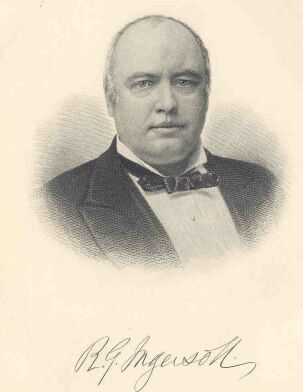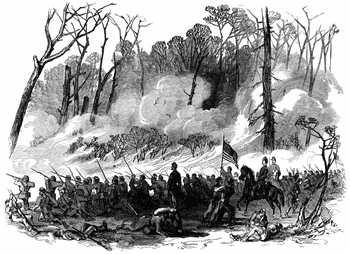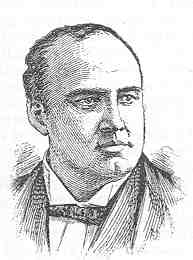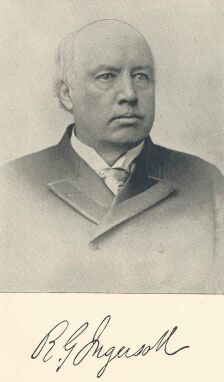|
Robert Green Ingersoll
frontispiece Robert G. Ingersoll, Prose-Poems and Selections
from the Writings "A noted lawyer and politician of Peoria, Illinois, and more recently of New York city, famous also as a lecturer and writer strongly opposed to the Christian religion." [Oscar Fay Adams, A Dictionary of American Authors 204 (Boston: Houghton, Mifflin and Company, 1899)] Robert G. Ingersoll was born, by his own account, on either August 11,or August 12, 1833 at Dresden, New York near Lake Seneca, New York. [Homeplace museum] [Birthplace]. His father, John Ingersoll, was born in Rutland, Vermont on July 5, 1792 and studied briefly for the ministry at Middlebury College, a profession he thereafter pursued with some vigor. Ingersoll's mother died when he was two. During the course of his childhood his father moved from ministry to ministry, living at one time or another in New York, Ohio, Wisconsin, Michigan, Indiana, Kentucky and Illinois. He made little money as a preacher and the family was quite poor. When Ingersoll was seventeen or eighteen his father had established himself at Greenville, Illinois where he continued to pursue his abolitionist work (work which may help account for his frequent moves). It was at Greenville, that Robert Ingersoll published his first poem; it appeared in the Greenville Journal in June, 1852. By the fall of 1852, Ingersoll had so impressed his teacher, Socrates Smith, that he was pronounced ready himself to teach. He writes one of his brothers in September, that he has arrived in Mount Vernon, Illinois and will teach there. By 1853 he seems already to have moved to Metropolis, Illinois, in the extreme southern part of the state. Teaching now, wherever he can find a position (not unlike his father's preaching), he moves again, this time in the autumn of 1853 to Waverly, Tennessee. Upon his return north from the Tennessee teaching position (probably in 1854), he began the study of law in Marion, Illinois in the law office of Willis Allen and his son, William Joshua Allen. Ingersoll worked during this time as an assistant to the clerk of the Circuit and in the County Court's office to support not only himself but his father and a sister. It appears that Ingersoll's brother Ebon Clark had joined him in Marion in the study of law and the Ingersoll brothers were admitted to the bar in Mount Vernon, Illinois on December 20, 1854. Robert was twenty-one years old. Ingersoll's first legal work was of an administrative nature and he undertook still further study in the law office of Judge William G. Bowman, a noted Illinois attorney who maintained an unusually good library which Ingersoll would use to further his education. "In this exciting library, about every evening until long past midnight, the young man read the works of the great poets, philosophers, historians, and scientists. It was here that he laid the foundation of his creative intellectual life . . . ." [Eva Ingersoll Wakefield, "Biographical Introduction," to The Letters of Robert G. Ingersoll 3-66, at 19-20 (New York: Philosophical Library, 1951)] Robert and Clark Ingersoll moved their legal practice to Shawneetown, Illinois. Clark, shortly thereafter, moved to Springfield in 1856, to serve in the Illinois legislature. In 1857, the practice, now the sole burden of Robert, was moved to Peoria where he practiced with various lawyers, including his brother-in-law, Eugene McCune. His practice encompassed a wide range of civil and criminal cases.
Robert Ingersoll was, over the forty plus years of his practice of law, to accomplish feats of a similar nature on enough occasions to make him a legend in his own time. On February 13, 1862, Robert Ingersoll was married to Eva Amelia Parker of Groveland, Illinois. She was the daughter of Mr. & Mrs. Benjamin Weld Parker, the leading family of the town. Ingersoll was in Groveland trying a case and had been invited to dinner by the Parkers when he met and feel rather immediately in love with Eva Amelia. Just months before his marriage, Ingersoll had joined the Union Army on September 16, 1961 and with Colonel Basil D. Meek began to help recruit volunteers to serve in a cavalry regiment. He was commissioned Colonel of the Eleventh Illinois Cavalry Regiment and in early November, 1961, the recruits began to appear at Camp Lyon at Peoria. The regiment presented itself for service on December 20, 1861. On March 26, 1862, little more than a month after his marriage, the Eleventh Illinois Cavalry was instructed to proceed to Pittsburgh Landing near Shiloh, where General Halleck was in command of the Union forces.
Frank Leslie's Illustrated Famous Leaders and Battle Scenes of the Civil War [Used with permission of the Florida Center for Instructional Technology] The regiment under Colonel Ingersoll's command was under the direction of General Prentiss at Pittsburgh Landing and they were engaged in the fight at the battle of Shiloh on April 6 & 7th. Those who survived the Battle of Shiloh then saw action at Bolivar, Tennessee in August, at Davis Bridge in September, and at Corinth in October. On December 2, 1862, Ingersoll was appointed Chief of Cavalry on the staff of Brigadier General Jeremy C. Sullivan. In December, 1962, Ingersoll arrived in Jackson, Tennessee with his regiment where he (and other Union forces) faced General Nathan Bedford Forrest. After fight against overwhelming opposition, Ingersoll was captured and sent to St. Louis where he was placed in charge of a camp of paroled prisoners. He waited months be be exchanged so he could reenter active service but eventually resigned his commission and was discharged on June 20, 1863. After the war, Ingersoll and Eva Amelia had two children and Robert resumed his law practice. He took on the representation of the Peoria and Rock Island Railroad and from 1874 to 1878 he represented other railroads as well. In 1867, Governor Richard J. Oslesby appointed Ingersoll Attorney-General of Illinois. In 1868, Ingersoll's attempt to secure nomination as Governor faltered and he thereafter abandoned his personal political career although he maintain an active hand in politics. In 1877 or early 1878, Ingersoll having become increasing prominent in his legal practice, moved his family to Washington, D.C., where he again created a law practice with his brother, Ebon Clark. His brother had been living in Washington since he was elected to Congress in 1864. The brothers' law partnership continued until Clark's death in 1879. In 1883, Ingersoll moved the family, again, this time to New York City where he reestablished his law practice. Roger Ingersoll is now remembered for his skills as an orator and for his writings and speeches on agnosticism (which began as early as 1860 just before he offered his services to the Union Army and continued throughout the rest of his life). Robert
G. Ingersoll—An Intimate View Robert Green Ingersoll
(1833-1899)
Poetry Robert G. Ingersoll, Prose-Poems and Selections from the Writings and Sayings of Robert G. Ingersoll (New York: C.P. Farrell, 1884)(10th ed., 1925) Correspondence Eva Ingersoll Wakefield (ed.), Letters (New York: Philosophical Library, 1951) Collected Works Robert G. Ingersoll, The Works of Robert G. Ingersoll (New York: C. P. Farrell, 1900)(12 vols.) Robert Green Ingersoll, Complete Works Speeches Henry McNeal Turner, The Barbarous Decision of the United States Supreme Court Declaring the Civil Rights Act Unconstitutional and Disrobing the Colored Race of All Civil Protection. The Most Cruel and Inhuman Verdict Against a Loyal People in the History of the World. Also the Powerful Speeches of Hon. Frederick Douglass and Col. Robert G. Ingersoll, Jurist and Famous Orator (Atlanta, Georgia: [s. n.], 1893) [online text] Writings Robert G. Ingersoll, A Few Reasons for Doubting the Inspiration of the Bible (New York: The Truth Seeker Co., 189-?) _______________, Abraham Lincoln, a lecture (New York: C. P. Farrell, 1895)(1909) _______________, Crimes Against Criminals (East Aurora, New York: Roycrofters, 1906) _______________, Col. R.G. Ingersoll's Famous Speeches Complete (New York: L. Lipkind, 1906) _______________, Abraham Lincoln (New York: J. Lane company, 1907) _______________, Colonel Robert G. Ingersoll's 44 Complete Lectures (Chicago: M. A. Donohue, 1924)(1929) _______________, The Gods, and Other Lectures (New York: Willey Book Company, 1938) _______________, Some Mistakes of Moses (New York: Freethought Press Assoc., 1967) _______________, The Best of Robert Ingersoll: Immortal Infidel: Selections from His Writings and Speeches (Buffalo, New York: Prometheus Books, 1983)(Roger E. Greeley editor) _______________, On the Gods and Other Essays (Buffalo, New York: Prometheus Books, 1990)(preface by Paul Kurtz) Biographical Sources Henry M. Field, Faith or Agnosticism?: The Field-Ingersoll Discussion (Austin, Texas: American Atheist Press, 1988)(series of articles from the North American Review, 1888) Herman E. Kittredge, Ingersoll: A Biographical Appreciation (New York: The Dresden Pub. Co., 1911) [online text] Orvin Prentiss Larsen, American Infidel: Robert G. Ingersoll (New York: Citadel Press, 1962)(Madison, Wisconsin: Freedom From Religion Foundation, 1993) Joseph Lewis, Ingersoll The Magnificent (New York: FreeThought Press, 1957) [online text] Cameron Rogers, Colonel Bob Ingersoll: A Biographical Narrative of the Great American Orator and Agnostic (Garden City, New York: Doubleday, Page & Company, 1927) "Robert Greene Ingersoll," in Henry W. Scoll, Distinguished American Lawyers with Their Struggles and Triumphs in the Forum 473-486 (New York: Charles L. Webster, 1891) Frank Smith, Robert G. Ingersoll: A Life (Buffalo, New York: Prometheus Books, 1990)
Research Resources Ingersoll Family Collection Papers of the Ingersoll Family, 1875-1923 Levy
Collection of Papers of Robert G. Ingersoll Ebon
Clark Ingersoll |



